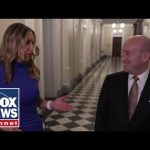Concerns about security threats from the Chinese Communist Party (CCP) have reached a fever pitch as the U.S. government underscores the risks posed by Chinese students studying in American universities. For years, the CCP has exploited visa systems meant for educational purposes, using them instead to engage in espionage and intellectual property theft. This alarming trend has caught the attention of policymakers, particularly as reports surface about attempts to infiltrate prominent institutions such as Stanford University.
The situation has prompted officials, including Secretary of State Marco Rubio, to take decisive action against potential abuses. The plan? A rigorous review and possible revocation of visas for students linked to the CCP. With over 277,000 Chinese students currently studying in the U.S., there is growing suspicion about their intentions, especially when studies indicate that as many as 13% of these students have participated in acts of espionage against the country. The implications of such findings are serious, as they highlight a significant security vulnerability within American borders.
Adding to the concern is the revelation of clandestine Chinese police stations in cities across the United States, including one in New York’s Chinatown. These stations are reportedly used for monitoring Chinese nationals, which raises red flags about the CCP’s reach and influence on American soil. Experts argue that this direct oversight has far-reaching consequences, potentially compromising the safety and freedom of individuals in the U.S. If students are being utilized as tools of the CCP, the integrity of education and research institutions is at risk.
Those who argue for a tougher stance on this issue don’t hold back. They emphasize the need for urgent measures in light of the alarming statistics surrounding espionage. Discussions have shifted from mere concern to a call for action, with many suggesting that drastic steps are necessary to counteract the threats posed by Chinese policies. There is a sense that previous methods have failed, and thus, a new approach is both warranted and required to safeguard national interests.
As tensions between the U.S. and China escalate, it remains unclear how these developments will affect the future of academic exchanges between the two nations. Experts stress the importance of vigilance in monitoring the activities of foreign students, especially those from countries with hostile governmental agendas. While many individuals truly seek education and understanding, there is a growing sentiment that the U.S. must protect itself from those who would use education as a cover for nefarious intents.
In conclusion, as the narrative surrounding Chinese students in American universities unfolds, it invites a much broader conversation about national security, education, and the implications of foreign influence in American institutions. The government’s new directives signal a shift in policy that aims to safeguard the interests of the nation, putting a spotlight on the vital importance of who gets to study in the U.S. and under what circumstances. It’s a delicate balance, but one that the nation must navigate carefully in this rapidly changing global landscape.




